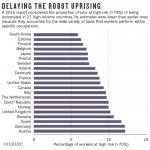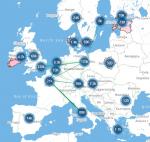Fiscal strategies, social protection and labour market policies should consider support the increasing independent, solo-preneurship, and flexible work systems to address the root-causes of the emerging work...
Search results (14)
Showing results 1 to 10
KS specific taxonomy
Knowledge service
As AI is changing the jobs landscape, investing in re-skilling and education of workers is mandatory in order to help them adjust to new requirements and avoid having tens of millions of people...
Proportion of jobs with high risk (>70%) of being automated in 21 high-income countries. Source: Nature, Anthes Emily, (2017), The shape of work to come. Three ways...

Source: Shifting tides: Global economic scenarios for 2015–25, McKinsey Global Growth Model, April 2015

Focus of policy should switch from primarily economic to socio-economic, as the scope and spectrum of digitalization expands and affects most sectors and activities. With increasing demographic imbalances, retirement and fiscal...
Coherent strategies and policy approach are needed to avoid potential disruptive structural changes and to assure that digitalization benefits the majority of the population, encourages further innovation and development...
Digital technologies will fundamentally change business models, institutions and society as a whole, as new ecosystems emerge. The “digital revolution” is impacting everything from economy, innovation, science...
Shared economy platforms (e.g. Uber, AirBnB, Helping, Upwork, etc.) proliferate outside the existing labour laws and regulations; therefore, new employment and self-regulation system...
EU-wide policy should regulate the social and economic aspects of AI and robotisation (including robot taxation) to guarantee a standard level of economic benefit and security for society. More...
Source: Startup Hub Europe

